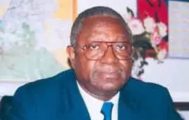Categories
Recent Posts
- Cameroonian youth urged to embrace hope despite multiple challenges
- Bishop of Bafoussam calls on voters to ‘make no mistake’ in this year’s election
- World Bank increases funding to Cameroon by 21%
- Ukraine: Trump blames Zelensky for starting war after massive Russian attack
- Minister Obi Eta Jerome’s death – What do we know?
Archives
- April 2025
- March 2025
- February 2025
- January 2025
- December 2024
- November 2024
- October 2024
- September 2024
- August 2024
- July 2024
- June 2024
- May 2024
- April 2024
- March 2024
- February 2024
- January 2024
- December 2023
- November 2023
- October 2023
- September 2023
- August 2023
- July 2023
- June 2023
- May 2023
- April 2023
- March 2023
- February 2023
- January 2023
- December 2022
- November 2022
- October 2022
- September 2022
- August 2022
- July 2022
- June 2022
- May 2022
- April 2022
- March 2022
- February 2022
- January 2022
- December 2021
- November 2021
- October 2021
- September 2021
- August 2021
- July 2021
- June 2021
- May 2021
- April 2021
- March 2021
- February 2021
- January 2021
- December 2020
- November 2020
- October 2020
- September 2020
- August 2020
- July 2020
- June 2020
- May 2020
- April 2020
- March 2020
- February 2020
- January 2020
- December 2019
- November 2019
- October 2019
- September 2019
- August 2019
- July 2019
- June 2019
- May 2019
- April 2019
- March 2019
- February 2019
- January 2019
- December 2018
- November 2018
- October 2018
- September 2018
- August 2018
- July 2018
- June 2018
- May 2018
- April 2018
- March 2018
- February 2018
- January 2018
- December 2017
- November 2017
- October 2017
- September 2017
- August 2017
- July 2017
- June 2017
- May 2017
- April 2017
- March 2017
- February 2017
- January 2017
- December 2016
- November 2016
- October 2016
- September 2016
- August 2016
- July 2016
- June 2016
Featured
 Burkina Faso: Where vision meets discipline
Burkina Faso: Where vision meets discipline  Prosecution of journalists in Cameroon: European Parliament says enough red flags have been ignored
Prosecution of journalists in Cameroon: European Parliament says enough red flags have been ignored  1982-2025: How long will Biya hang on?
1982-2025: How long will Biya hang on?  How Biya and Archbishop Nkea protected the sanctity of the family in Cameroon
How Biya and Archbishop Nkea protected the sanctity of the family in Cameroon  October Presidential Election: Will 92-year-old Biya be re-elected?
October Presidential Election: Will 92-year-old Biya be re-elected?
Most Commented Posts
 4 Anglophone detainees killed in Yaounde
4 Anglophone detainees killed in Yaounde
18 comments Chantal Biya says she will return to Cameroon if General Ivo Yenwo, Martin Belinga Eboutou and Ferdinand Ngoh Ngoh are sacked
Chantal Biya says she will return to Cameroon if General Ivo Yenwo, Martin Belinga Eboutou and Ferdinand Ngoh Ngoh are sacked
13 comments The Anglophone Problem – When Facts don’t Lie
The Anglophone Problem – When Facts don’t Lie
12 comments Anglophone Nationalism: Barrister Eyambe says “hidden plans are at work”
Anglophone Nationalism: Barrister Eyambe says “hidden plans are at work”
12 comments Largest wave of arrest by BIR in Bamenda
Largest wave of arrest by BIR in Bamenda
10 comments
Latest Tweets
Error: access keys missing in Themify > Settings > Twitter SettingsFeatured
-

Cameroonian youth urged to embrace hope despite multiple challenges
-

Bishop of Bafoussam calls on voters to ‘make no mistake’ in this year’s election
-

World Bank increases funding to Cameroon by 21%
-

Ukraine: Trump blames Zelensky for starting war after massive Russian attack
-

Minister Obi Eta Jerome’s death – What do we know?
-

Pope Francis transfers Cameroonian-born Nigerian Apostolic Nuncio in Sri Lanka to Ethiopia
-

CDC banana exports hit 10,400 tons in Q1 2025
© Cameroon Concord News 2025
3, September 2019
Grave Questions About Fairness of Trial: Ambazonia Leaders Appeal Conviction 0
Ten leaders of the separatist Ambazonia Interim Government in Cameroon lodged an appeal on August 26, 2019, against their August 20 convictions and life sentences by a military court following a trial that raises serious concerns of due process and violations of fair-trial rights.
Although the trial, on charges including terrorism, rebellion, and secession, commenced in December 2018, all the alleged evidence against the men was only presented to the defense in court during a single 17-hour overnight hearing that started on August 19. The court admitted thousands of pages of statements and documents as evidence against the accused and over 1,000 items of forensic evidence, such as guns, spears, and laptops, that defense lawyers told Human Rights Watch they did not know about and were unable to examine, discuss with their clients, or effectively challenge.
“It appears that the military court handed down a hasty verdict and sentence without giving the accused any meaningful opportunity to defend themselves,” said Lewis Mudge, Central Africa director at Human Rights Watch. “This process has been plagued by pretrial abuses and serious allegations of fair-trial breaches that warrant independent and impartial judicial review, which we hope will happen under appeal.”
The trial, which was conducted in French without adequate translation though the defendants were entitled to a trial in English, their mother tongue and an official language in Cameroon, took place after serious violations of the defendants’ rights in detention. Defense lawyers accused the judges of bias and withdrew from the proceedings after the main military judge threatened them with arrest for raising objections.
Sisiku Ayuk Tabe, head of what is known as the “Ambazonia government,” and nine other leaders had been arrested in January 2018 in Nigeria’s capital, Abuja, and forcibly returned to Cameroon, in an extrajudicial transfer that was denounced by the United Nations Refugee Agency as violating the fundamental principle of non-refoulement – the practice of not forcing refugees or asylum seekers back to a country where they risk persecution, torture, or other cruel, inhuman, or degrading treatment. The forced return of the 10 leaders was also declared illegal by a Nigerian court in March 2019. The men were then held in incommunicado detention at the State Defense Secretariat detention facility (Secrétariat d’État à la défense, SED) for six months, during which they had no access to their lawyers and families. Human Rights Watch has documented that torture and other abuses are endemic at the SED.
Fru John Nsoh, lead counsel for the separatist leaders, told Human Rights Watch that while the trial of his clients started in December 2018, all hearings prior to August 19 focused on peripheral procedural matters. He said that defense lawyers had no prior knowledge of the evidence presented to the court by the prosecution, and were not given any chance to view, comment, or object to the evidence, nor were they permitted to cross examine the four witnesses called by the prosecution.
The men were also tried before a military tribunal, despite international standards deeming the trial of civilians in military courts, in principle, to be incompatible with the right to a fair trial. Cameroon has been condemned by the UN Human Rights Committee for prosecuting civilians before military tribunals. The African Commission on Human and Peoples’ Rights has also repeatedly reinforced that under regional human rights standards, including the African Charter on Human and Peoples’ Rights, the trial of civilians in military courts is prohibited without exception, and that the only purpose of military courts should “be to determine offences of a purely military nature committed by military personnel.”
The crisis unfolding in Cameroon’s Anglophone regions broke out around October 2016, when students, teachers, and lawyers from the region took to the streets to demand greater respect for their rights. In response, security forces unlawfully killed and arbitrarily arrested peaceful protesters, escalating the crisis. Since then, numerous separatist groups have emerged, taking up arms and calling for the independence of the North-West and South-West regions, which they call “Ambazonia.”
Armed separatists have committed numerous abuses against civilians, including kidnappings for ransom, torture, and unlawful killings. They have also attacked dozens of school buildings and occupied them. They have also enforced a boycott of schools, disrupting the education of thousands of children since 2017. Human Rights Watch cannot comment on the credibility of the charges brought against the men in connection with any crimes committed by armed separatists.
The Cameroon military court also ordered the 10 men to pay fines totalling 262 billion CFA francs (US$442,000) for civil damages and court costs.
“To conduct a trial with these kinds of due process violations is no way to uphold rule of law and human rights in the midst of an escalating crisis in the Anglophone regions of Cameroon,” Mudge said. “The Cameroonian authorities should focus on addressing the legitimate grievances of its Anglophone population and make sure that members of the security forces who are responsible for abuses are held accountable.”
Source: Human Rights Watch